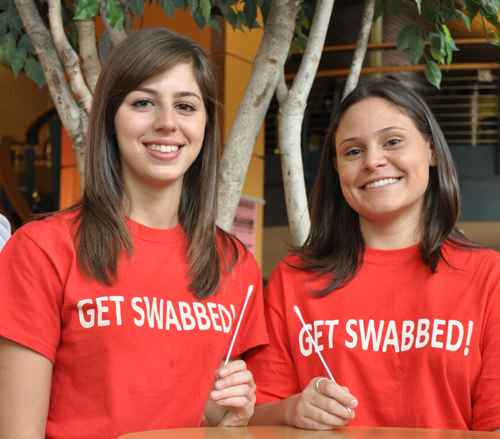
Open your mouth and get swabbed. That’s all it takes to join the national bone marrow registry. You could be the match that saves someone’s life. More than 900 people in Canada are currently waiting for a match.
U of G held its first Get Swabbed event in 2010 with the help of organizers Sarah Paolucci and Sarah Zammit, fourth-year human kinetics students, and almost 80 student volunteers. They collected cheek swabs from 1,066 people; this year’s goal is 2,000 people. The samples will go to the OneMatch Stem Cell and Marrow Network, a branch of Canadian Blood Services, where they will undergo human leukocyte antigen tissue-typing, a process used for matching.
Get Swabbed started at McMaster University in 2009 and has since become a nationwide university challenge. Guelph students are holding this year’s Get Swabbed event in the University Centre courtyard on Nov. 4 between 8 a.m. and 8 p.m.
“The main goal of the event is to increase the diversity of the network,” says Paolucci. “Patients have a greater success rate if they have a donor from their own ethnic group.” More than 70 per cent of the current donor network is Caucasian.
“All it takes is that one person to really make a difference,” adds Zammit. “You never know who it could be. It could be the person sitting next to you in class. That’s why our goal is to get as many people registered as possible to hopefully find that person.”
Making a stem cell match is more complicated than matching blood types, she adds. That’s why the registry needs a large number of donors to find just one match. Less than 30 per cent of patients who need a stem cell transplant find a match among their own family members.
To get swabbed, participants must be between the ages of 17 and 50, bring their health card or photo ID and complete a brief health questionnaire.
“There is absolutely no obligation to donate even if you do register,” says Zammit. “Sometimes, you’ll be called up years after you register and, depending on where you are at that point in your life, you may not be able to donate.”
Guelph resident Josh Martin is alive today because of a bone marrow transplant. He was diagnosed with chronic myelogenous leukemia in January 2008. Within a month of his diagnosis, his condition deteriorated and he was given a 50-per-cent chance of survival. His doctors told him he needed a bone marrow transplant, but none of his seven siblings were a match. After seven months of chemotherapy and radiation, he received a bone marrow transplant from a donor in Europe. He has been cancer-free for the past three years.
“I’m an example of how important the bone marrow registry is,” says Martin, who has blogged about his experience and will be volunteering at this year’s Get Swabbed event. “I had to rely on the generosity of complete strangers.”
Seven-year-old Alysha Dykstra of Guelph is waiting for a bone marrow transplant after being diagnosed with acute lymphoblastic leukemia in November 2008. Alysha’s parents are Guelph grads Mark, BLA ’93, and Karen, B.A.Sc. ’90, Dykstra.
When a donor couldn’t be found in their family, they launched Operation Alysha to raise awareness of the need for more donors. Alysha received a stem cell transplant from a donor’s cord blood in June 2009, but it wasn’t a perfect match and her own cells returned. Doctors have since discovered a new type of leukemia in her body. Although she’s doing well, Karen says her daughter may need another transplant in the future. Alysha plans to attend Get Swabbed on Nov. 4. “It takes so little time, and you could save a life,” says Karen.